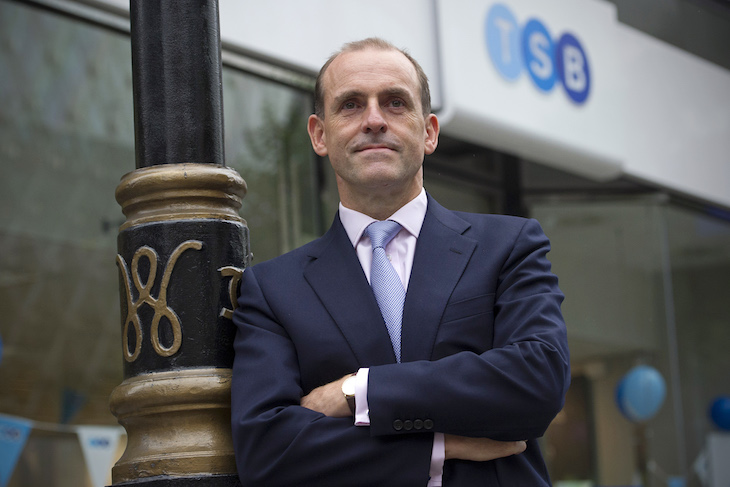Should he stay or should he go — or will he already have gone by the time you read this? These are frequently asked questions about chief executives whose businesses hit troubled waters. It’s true that the higher you rise, the higher the risk if you don’t deliver, but it’s not always true that bosses should walk the plank whenever something major goes wrong: sometimes it makes more sense to stick around, take the flak and solve the problem. However, in the cases of Gavin Patterson of BT (ousted a week ago) and Paul Pester of TSB (still in post as we go to press), it would be fair to say the only way is exit.
You just have to look at BT’s share price graph, sinking steadily since late 2015, to see why investors were waiting for the steely-eyed incoming chairman Jan du Plessis to axe Patterson, whose glamorous personal PR has disguised the telecoms giant’s continuing failure to roll out superfast broadband at an adequate rate, generally please customers, meet regulatory expectations or deliver shareholder value. When Patterson announced a cull of 13,000 BT staff a month ago, many pundits suggested he should have been top of the list; du Plessis briefly tested the wind of opinion before making that happen, exactly as a good chairman should.
As for Paul Pester at TSB, his response to his bank’s systems meltdown in April now looks so inadequate in relation to the customer distress caused that, after two botched attempts to explain himself to the Treasury select committee, he would be ill-advised to cling on. I say that even though it seems to have been largely the fault of TSB’s Spanish parent, Sabadell, rather than Pester himself, that the transfer of accounts from old systems to Sabadell’s own platform was so poorly prepared, with no plan to cope with the huge volume of online fraud attempts that followed the breakdown.
Sabadell ought to be sending in its best operations manager to replace Pester. But the evidence of this episode suggests that might actually make matters worse. Perhaps they should call up Santander — the Spanish bank with the most UK experience, plus a reputation for robust systems and management in depth — and beg to borrow someone senior and competent. In the old days, the Bank of England would have quietly made that happen, without the need for select committee show trials.
Knights watch
It’s good to know the honours committee are following this column. I said in April that retiring Royal Mail chief Moya Greene deserved a damehood, and she got one in the Queen’s birthday list. Likewise I suggested a knighthood for ‘industrial hero’ Jim Ratcliffe, founder of the Ineos conglomerate, and now he has one, as does veteran bookseller Tim Waterstone, who I have also praised. On the other hand, the time when big-shot bankers could expect knighthoods as a matter of course is rightly long gone, so I’m surprised to see ex-HSBC chairman Douglas Flint on the list: a stopgap for the top job, this Glaswegian numbers man never got to grips with the reputational issues — from mis-selling to money-laundering — that afflicted HSBC on his watch. But he’s also a grandee of the international accountancy profession, and I guess establishment pecking orders still sometimes hold sway.
Ahoy there
Sailing off Majorca at the weekend, we spot a big, ugly vessel that might be a Barcelona car ferry but for the helicopter strapped to its top deck and the jet skis buzzing round its stern. On closer inspection — not too close, there’s a security boat circling — this turns out to be Katara, a $300 million super-yacht owned by the ruling Al Thani family of gas-rich Qatar. Built in Germany, with a crew of 60, few of whom are likely to be native Qataris, she’s a conspicuous example of global trickledown and there’s really no need to be offended by the sinister way she dwarfs everything else in the bay. Quite the reverse, in fact. What I have often called ‘the curse of Qatar’ is currently manifesting itself in an economic boycott by Saudi Arabia and other neighbours in response to Qatar’s alleged links to Iran and Islamist terror, and a scramble to complete the infrastructure for the controversially awarded 2022 World Cup, not to mention a load of troublesome foreign investments. All very stressful: so it’s good, in the holy month of Ramadan, that Katara offers our Gulf trading partners commodious relaxation away from prying eyes.
Chasing Aramco
Speaking of friends in the Middle East, the Financial Conduct Authority’s decision to endorse a new ‘premium listing’ on the London Stock Exchange for companies controlled by sovereign states, in the continuing hope of attracting the lucrative flotation of Saudi Aramco, has drawn protests from bodies such as the Institute of Directors and the International Corporate Governance Network. The FCA’s Andrew Bailey says the new category will ‘encourage more companies to adopt the UK’s high governance standards’, whereas objectors fear the opposite: a lowering of standards to accommodate companies controlled by unsavoury regimes that are not going to be told how to behave by the LSE. In particular, such companies will be free of normal rules requiring arm’s length dealings with their controlling shareholder and related companies.
I said six months ago that the premium listing idea smacked of desperation to maintain London’s global position after Brexit. Meanwhile, the Saudis have not only held back from naming London, New York or Hong Kong as their chosen bourse, but have delayed the whole Aramco deal at least until next year. My man in the camel market tells me expats hired to work on the prospectus at the oil giant’s HQ in Dhahran (current temperature 45°C) have been twiddling their thumbs for months. The biscuit for which the FCA and LSE are rolling over like spaniels may not be there to be won.







Comments